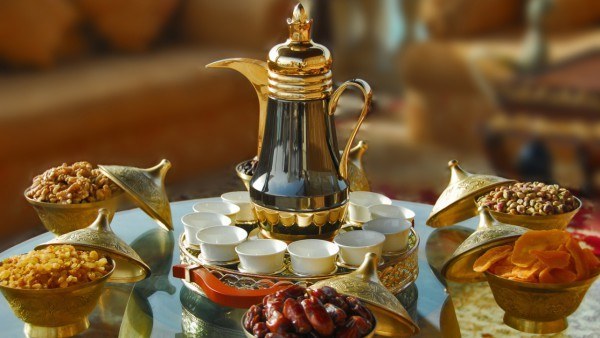Arabic coffee refers to a sumptuously flavored version of coffee brewed from Arabica coffee beans that is one of the two prominent species of coffee beans, another being Robusta. Meticulously cultivated at an altitude ranging from 1,200 meters to 1,500 meters, Arabica coffee accounts for about 80% of the world’s coffee bean manufacture and is considered exceptional for its superior taste and quality. In most Arab countries across the Middle East, serving coffee is an important part of their warm hospitality and tradition. In fact, they have developed their own unique way of brewing and preparing the coffee. Let’s find out 5
interesting facts about Arabic Coffee
.
History:
Believed to have been originated in Ethiopia, coffee has a long history dating back to the 9th century. The coffee’s origin is largely attributed to Kaldi – a goat herder, who first noticed the increased level of goats’ energy upon chewing certain berries. Based on the information from Kaldi, the local monastery’s Abbot did some experiment using these berries, which eventually turned out to be an energizing drink. It made its way to Middle Eastern and Northern African regions during the 15th century, and later on, it traveled to Italy and other European regions as well as to the Americas. Today, coffee is widely consumed across the world and is especially lauded for its rich taste and tempting flavor.
Preparation:
Though unanimously referred to as Arabic coffee, it is categorized into two: Al-Qahwa (Saudi coffee) Turkish-style coffee. While Qahwa is prepared using heavily roasted beans, Turkish coffee is made with roasted and finely grounded Arabica coffee beans. In the UAE, it is mostly called Khaleeji. The coffee beans are readily available in Arabic supermarkets, souks and even in malls. Speaking of its preparation, it is mostly made in a traditional coffee pot, namely, dallah. A variety of items such as cardamom, cloves, and saffron, in addition to coarsely grounded Arabic coffee beans, can be used for its making. Add ground coffee followed by cardamom and cloves to the boiling water. After 10 minutes, remove it from the heat and allow the grounded coffee beans to settle down. Then strain and transfer the steaming coffee into a thermos flask.
Nutrition Facts:
A small cup of brewed Arabic coffee is almost free of any calories or fat. However, its protein content is very minimal amount adds up to its calorie. Likewise, though Arabic coffee does not contain carbohydrates, the consumption of coffee with sugar or cream will certainly reflect its carbohydrate levels.
Health Benefits:
Major studies reveal that Arabic coffee’s intake can minimize the onset of such devastating ailments as Type II diabetes, dementia, heart diseases, and even certain types of cancer. That said, make it a point to take coffee in moderate quantity due to the presence of caffeine, which in turn can be causative for the narrowing of blood vessels. Likewise, people with conditions such as high blood pressure and insomnia should avoid or cut down the intake of coffee.
Etiquette:
Ingrained in customs and hospitality, Arabic coffee finds a prominent position in traditional Arabic feasts, special occasions such as Ramadan and Eid, and even during social gatherings as well as business meetings. It is not only unique in terms of its preparation but also for its serving and the way it’s savored. Finjaan – a cute but tiny and delicate cup – is used to serve Arabic coffee. At most, it will be only half-filled, and the guest should have at least one cup of Arabic coffee, although the custom is to intake three cups.

Interesting to learn about the social etiquette related to serving and enjoying Arabic coffee.
[…] Photo Credits // raynatours […]
After done with reading the blog, I literally went into the kitchen and prepared a cup of coffee for myself, though not Arabic, but the one I had on my kitchen shelf. The blog is so interesting.
Amazed to read the nutritional facts and health benefits of the Arabic coffee. Thanks for the valuable facts about the traditional drink.
The taste of coffee can be enjoyed only by following the right preparation method. Sadly, which, many are unaware of. The coffee preparation tips in the blog will help you enjoy it perfectly.
Never thought that Arabic coffee would have such interesting facts. Next time whenever I enjoy a cup of Arabic coffee, I will remember these facts and enjoy every single sip of the coffee with great delight.
Great blog and its specified all most all about Arabic Coffee ( qahwa) and its benefits.
Thank you for your great blog.
Really good blog about Arabic coffee, every Arabs will like to have an Arabic coffee, it is the culture and tradition. In every special occasions they are serving Arabic coffee with dates.
The small cup called finjan is usually used for serving Arabic coffee. The way of serving Arabic coffee also little bit different with another coffee serving only more than half cup in finjan is used to serve. Finjan is a non-handled small cup.
The special Arabic coffee now we can easily make with some electrical dallah like Arab Dalla, Arab Dalla is with electrical and digital base. That helps to make Arabic coffee easily. Alarm and auto cut off make it easy.
The Saudi Arabian coffee lovers are usually use Arab dalla for the preparation of their Arabic qahwa, now all the other countries like Kuwait, Qatar, Oman and Dubai are using the same electrical dallah for making Arabic coffee with Arab dallah.
Having Arabic coffee is good for health, habit of arabic coffee improves the immunity of the health too